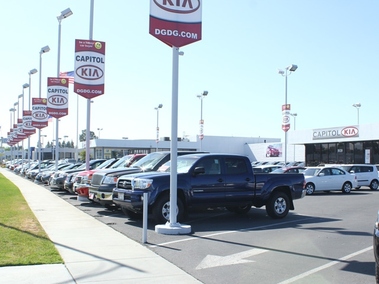Subprime Auto Loans Were Up 18% In 2012

Yesterday we got news that the Obama administration is pushing banks to make subprime home loans again. Today comes word that in 2012, subprime auto loans were up 18%:
The Fed’s program, while aimed at bolstering the U.S. housing and labor markets, has also steered billions of dollars into riskier, more speculative corners of the economy. That’s because, with low interest rates pinching yields on their traditional investments, insurance companies, hedge funds and other institutional investors hunger for riskier, higher-yielding securities – bonds backed by subprime auto loans, for instance.
Lenders like Exeter have rushed to meet that demand. Backed by Wall Street banks and big private-equity firms, they have been selling ever-greater amounts of subprime auto loans in the form of relatively high-yield securities and using the proceeds to fund even more lending to more subprime borrowers.
Expansion of the subprime auto business was chronicled in a 2011 Los Angeles Times series. Since then, growth has continued apace. Consider that in 2012, lenders sold $18.5 billion in securities backed by subprime auto loans, compared with $11.75 billion in 2011, according to ratings firm Standard & Poor’s. The pace has continued so far this year, with $5.7 billion of the securities issued, compared with $4.4 billion for the same period last year, according to Deutsche Bank AG. On Monday alone, three deals totaling $1.6 billion of subprime auto securities were announced by Wall Street banks.
What’s worse is that these subprime loans are coming at some pretty ridiculous interest rates that will almost assuredly result in bankruptcy:
To make up for the risk of taking on increasing numbers of high-risk borrowers, subprime auto lenders charge annual interest rates that can top 20 percent.
The Exeter loan Nelson and his wife got, for example, carried a 21.95-percent rate. Exeter, which is majority-owned by private-equity giant Blackstone Group, assumes that one in four borrowers will default on their loan, according to an Exeter investor pitch book reviewed by Reuters.
The government, believing that the economy needs more spending in order to recover, are pushing people to take out loans so they can buy houses, cars, etc.
The problem is that, while that sort of thing can create the appearance of economic stimulus in the short-term, in the long-term encouraging people to spend money they don’t have – money borrowed on terms they aren’t likely to meet – will only result in disaster. Meaning more bailouts. More national debt. More watering down the currency to make us all poorer.







